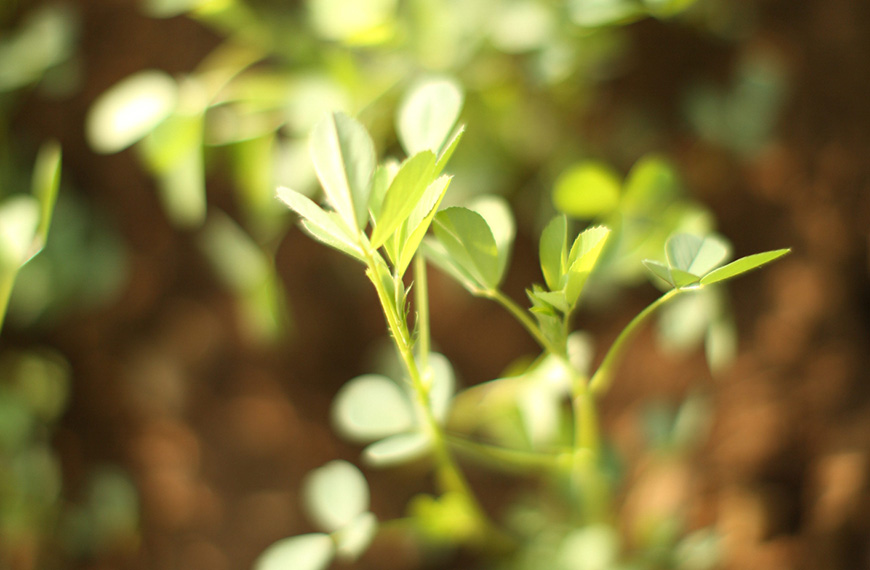5 Tips for Treating Your Alfalfa Right This Season

Alfalfa is not an easy crop to grow and requires pretty intense management. However, some farmers don’t give it much attention until it’s time to cut.
I’d argue alfalfa is a high-value crop that deserves to be diligently scouted and managed just like corn or soybeans or sunflowers. No matter how you use or market your alfalfa, it represents a significant investment of labor and money. Take the time to treat it right. Here are five tips for in-season alfalfa management.
1. Put boots on the ground.
It may sound obvious, but you can’t control what you can’t see. Be sure to scout your alfalfa fields, or have your agronomist do it, on a regular basis. For greater insights, pair these scouting efforts with the ag technology your agronomist offers, which can quickly alert you to critical field issues such as depleted biomass, disease and insects.
2. Make a preventive fungicide application.
A fungicide application, performed when your alfalfa is 6 to 8 inches tall, can help protect the plant from diseases such as bacterial leaf spot, spring black stem and lepto leaf spot, and help the plant retain more leaves.
3. Use a residual insecticide.
Technically, the right answer to the question “When should I spray for insects?” is “After you’ve scouted and if you need to.” Follow integrated pest management practices and spray when there are damaging insects present at a level that will justify the application. Insecticides with residual activity, such as Arctic® 3.2EC insecticide or Grizzly® Too insecticide, provide a longer period of control.
Be sure to follow label directions for both fungicide and insecticide applications. Also, adhere to preharvest intervals, even if you are pressed for time.
4. Evaluate plant nutrient levels by tissue testing.
Optimal timing for taking alfalfa tissue samples is at the beginning of bud stage, right before you cut. Your agronomist should remove the top 6 inches of the plant for testing. After you cut, wait for 6 inches of regrowth, and then do a foliar application of essential nutrients that testing has found to be deficient. Remember, lack of moisture will limit the benefits nutrients bring. Talk with your agronomist about whether nutrient applications make economic sense at various points of the year, depending on weather conditions.
5. Choose varieties with appropriate tolerance that fit your goals for next year.
Disease and insect tolerance differ widely among varieties, but are found to some degree in conventional alfalfas, Genuity® Roundup Ready® alfalfas and HarvXtra® Alfalfa with Roundup Ready® Technology. HarvXtra® Alfalfa varieties offer more flexibility in cutting schedules to achieve greater yield potential or improved forage quality. Geography often determines what stresses will be most prevalent in your area. As you think about your goals for 2018, work with your agronomist to choose varieties that fit your specific needs.
Don’t treat your alfalfa crop as an afterthought. Proactively manage it to optimize yield potential and make sure it’s an important part of your whole-farm crop management strategy.
Genuity and Roundup Ready are registered trademarks of Monsanto Technology LLC.
HarvXtra is a registered trademark of Forage Genetics International, LLC.
Growers must direct any product produced from HarvXtra® Alfalfa with Roundup Ready® Technology seed or crops (including hay and hay products) only to United States domestic use. In the following states, use of HarvXtra® Alfalfa with Roundup Ready® Technology is subject to a Seed and Feed Use Agreement, noting that this technology can only be used on farm or otherwise be used in the United States: Arizona, California, Colorado, Idaho, Montana, Nevada, New Mexico, Oregon, Utah, Washington and Wyoming. In addition, due to the unique cropping practices do not plant HarvXtra® Alfalfa with Roundup Ready® Technology in Imperial County, California, pending import approval in China and until Forage Genetics International, LLC (FGI) grants express permission for such planting. It is a violation of national and international law to move material containing biotech traits across boundaries into nations where import is not permitted. Growers should talk to their product purchaser to confirm their buying position for this product.
Visit www.ForageGenetics.com/legal for the full legal, stewardship and trademark statements for these products.


